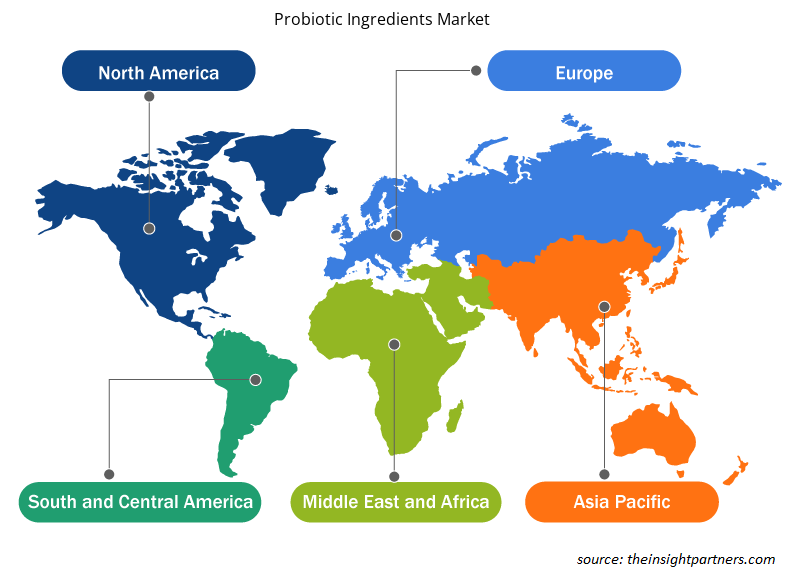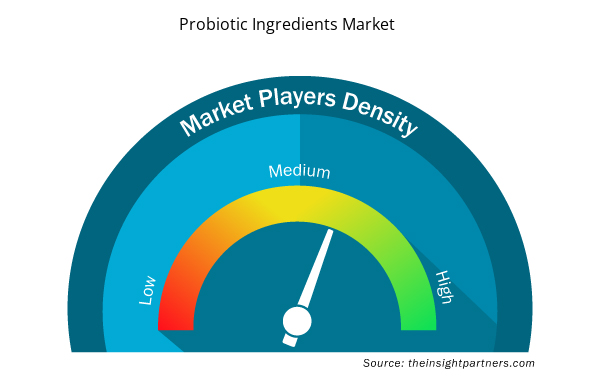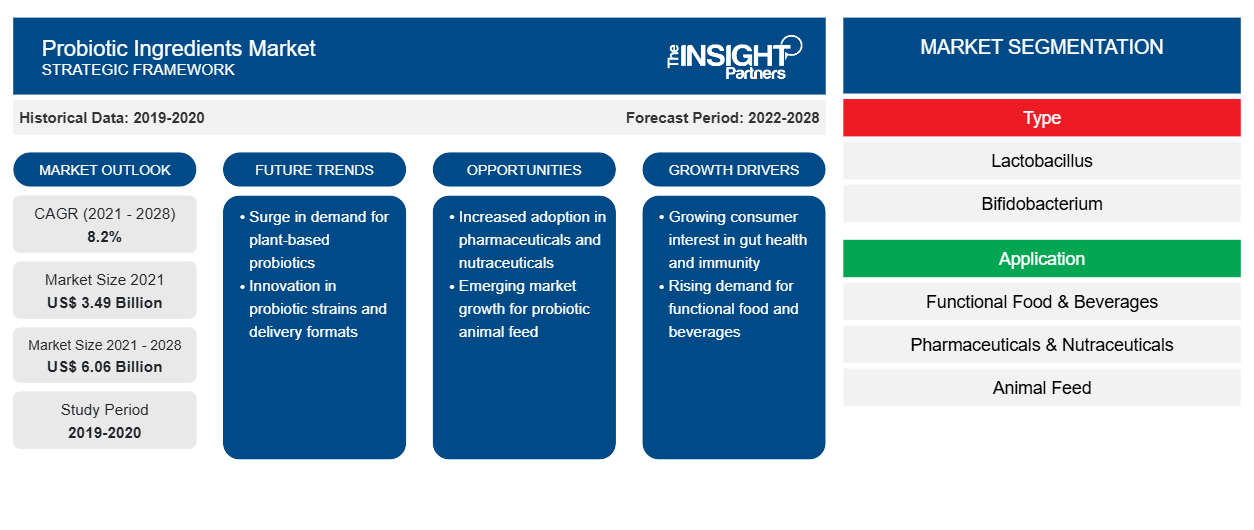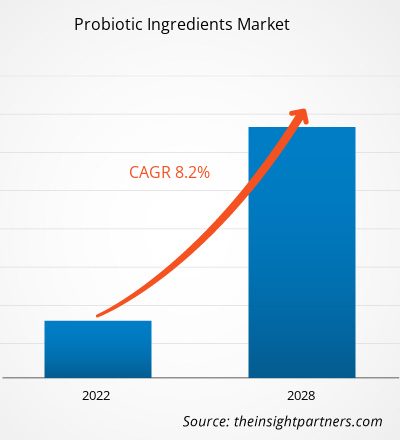Der Markt für probiotische Inhaltsstoffe soll von 3.493,42 Millionen US-Dollar im Jahr 2021 auf 6.060,51 Millionen US-Dollar im Jahr 2028 wachsen; von 2022 bis 2028 wird mit einer durchschnittlichen jährlichen Wachstumsrate von 8,2 % gerechnet.
Probiotika sind lebende Mikroorganismen, die bei Verzehr gesundheitsfördernd wirken, indem sie im Allgemeinen die Darmflora verbessern oder wiederherstellen. Der Verzehr von Probiotika gilt im Allgemeinen als unbedenklich. Probiotika spielen eine wichtige Rolle in der präventiven Gesundheitsfürsorge, da sie durch Stärkung des Immunsystems das Auftreten von Krankheiten verhindern. Daher wird erwartet, dass das steigende Bewusstsein für präventive Gesundheitsfürsorge das Marktwachstum im Prognosezeitraum ankurbeln wird.
Der asiatisch-pazifische Raum hatte 2021 den größten Marktanteil an probiotischen Inhaltsstoffen , während andere Entwicklungsregionen wie der Nahe Osten und Afrika im Prognosezeitraum voraussichtlich deutlich wachsen werden. Das Marktwachstum ist auf die steigende Nachfrage nach funktionellen Lebensmitteln und Getränken wie trinkbarem probiotischem Joghurt und Naturjoghurt sowie den wachsenden Einfluss der westlichen Kultur auf die junge Bevölkerung in der Region zurückzuführen. Darüber hinaus weiten die Hersteller von Probiotika ihre Aktivitäten im asiatisch-pazifischen Raum aus, da dort ein potenzieller Kundenstamm, billige Arbeitskräfte und ausreichende Produktionsanlagen vorhanden sind. Unternehmen wie Probi und Bio-k+ (Kerry) sind in der Region aktiv; dies wird voraussichtlich den Markt für probiotische Inhaltsstoffe im asiatisch-pazifischen Raum in den kommenden Jahren ankurbeln.
Passen Sie diesen Bericht Ihren Anforderungen an
Sie erhalten kostenlos individuelle Anpassungen an jedem Bericht, einschließlich Teilen dieses Berichts oder einer Analyse auf Länderebene, eines Excel-Datenpakets sowie tolle Angebote und Rabatte für Start-ups und Universitäten.
- Holen Sie sich die wichtigsten Markttrends aus diesem Bericht.Dieses KOSTENLOSE Beispiel umfasst eine Datenanalyse von Markttrends bis hin zu Schätzungen und Prognosen.
Auswirkungen der COVID-19-Pandemie auf den Markt für probiotische Inhaltsstoffe
Die COVID-19-Pandemie brachte Anfang 2020 für viele Branchen beispiellose Herausforderungen mit sich. Lockdowns, Grenzbeschränkungen, Reiseverbote, Produktionsunterbrechungen und andere Sicherheitsmaßnahmen, die von Regierungen gemäß den Richtlinien der WHO und der nationalen Gesundheitsministerien eingeführt wurden, behinderten die Produktionsabläufe. Der COVID-19-Ausbruch wirkte sich jedoch positiv auf den Markt aus, da Verbraucher zunehmend nach natürlichen und sichereren Alternativen suchen, um gesund zu bleiben und ihr Immunsystem zu stärken. Die Nachfrage nach Nahrungsergänzungsmitteln stieg in den ersten Monaten der Pandemie dramatisch an. Da die Menschen aufgrund der Regierungsauflagen zu Hause blieben, konzentrierten sie sich außerdem auf ihre Gesundheit und Fitness, was die Nachfrage nach Probiotika während der Pandemie ankurbelte.
Markteinblicke
Steigende Nachfrage nach mit Probiotika angereicherten Lebensmitteln und Getränken
Verbraucher werden gesundheitsbewusster und achten mehr auf ihren Lebensstil und ihre Ernährung, was zu einem weltweiten Nachfrageboom nach mit Probiotika angereicherten Lebensmitteln und Getränken führt. Um der Nachfrage der Verbraucher gerecht zu werden, entwickeln Lebensmittelhersteller verschiedene neue Produkte mit Anleitungen und Bildern als Reaktion auf den aktuellen Trend zu gesunder Ernährung. So brachte beispielsweise das japanische Unternehmen Yakult Honsha 1955 ein probiotisches Milchgetränk auf den Markt, das von mehreren Branchenexperten abgelehnt wurde. Heute ist es jedoch die weltweit größte probiotische Milchmarke mit Niederlassungen im asiatisch-pazifischen Raum, in Europa und Nordamerika, die das Marktwachstum vorantreibt.
Typbasierte Erkenntnisse
Der Markt für probiotische Inhaltsstoffe ist nach Typ in Lactobacillus, Bifidobacterium und andere unterteilt. Das Lactobacillus-Segment wird im Prognosezeitraum voraussichtlich den größten Anteil verzeichnen. Es gilt als eines der sichersten Bakterien, das als Probiotikum verwendet werden kann. Lactobacillus ist eine Bakterienart, die hauptsächlich in fermentierten Lebensmitteln wie Kefir, Sauerkraut und Joghurt verwendet wird. Lactobacillus-Stämme sind für Menschen hilfreich, da sie Darmerkrankungen lindern können, was die Nachfrage voraussichtlich steigern wird. Das Wachstum des Lactobacillus-Segments wird durch die zunehmende Verwendung von Probiotika in Lebensmitteln, insbesondere Milchprodukten, vorangetrieben, was das Wachstum des Marktes ankurbelt.
Anwendungsbasierte Erkenntnisse
Basierend auf der Anwendung ist der Markt für probiotische Inhaltsstoffe in funktionelle Lebensmittel und Getränke, Pharmazeutika und Nutraceutika, Tierfutter und andere unterteilt. Das Segment Pharmazeutika und Nutraceutika wird im Prognosezeitraum voraussichtlich die höchste durchschnittliche jährliche Wachstumsrate (CAGR) auf dem Markt verzeichnen. Die steigende Nachfrage nach vorbeugenden Medikamenten, eine wachsende Zahl von Verdauungsbeschwerden bei älteren Menschen und der Mangel an ausgewogener Ernährung werden wahrscheinlich die Produktnachfrage in der Nahrungsergänzungsmittelbranche erhöhen. Verbraucher bevorzugen aufgrund der zunehmenden Verbreitung ungesunder Ernährung zunehmend probiotische Nahrungsergänzungsmittel.
Die wichtigsten Akteure auf dem Markt für probiotische Inhaltsstoffe sind ADM; Novozymes A/S; Chr. Hansen Holding A/S; Kerry; Lallemand Inc.; IFF Nutrition & Biosciences; AngelYeast Co., Ltd.; Probiotical SpA; Adisseo; und Probi. Diese Akteure entwickeln Produkte mit reduzierten Gesundheitsrisiken, um aufkommende Verbrauchertrends zu erfüllen und gesetzliche Rahmenbedingungen einzuhalten. Sie sind an Fusionen und Übernahmen, Geschäftserweiterungen und Partnerschaften beteiligt, um ihren Marktanteil zu vergrößern.
Regionale Einblicke in den Markt für probiotische Inhaltsstoffe
Die regionalen Trends und Faktoren, die den Markt für probiotische Inhaltsstoffe während des Prognosezeitraums beeinflussen, wurden von den Analysten von Insight Partners ausführlich erläutert. In diesem Abschnitt werden auch die Marktsegmente und die Geografie für probiotische Inhaltsstoffe in Nordamerika, Europa, im asiatisch-pazifischen Raum, im Nahen Osten und Afrika sowie in Süd- und Mittelamerika erörtert.

- Erhalten Sie regionale Daten zum Markt für probiotische Inhaltsstoffe
Umfang des Marktberichts zu probiotischen Inhaltsstoffen
| Berichtsattribut | Details |
|---|---|
| Marktgröße im Jahr 2021 | 3,49 Milliarden US-Dollar |
| Marktgröße bis 2028 | 6,06 Milliarden US-Dollar |
| Globale CAGR (2021 - 2028) | 8,2 % |
| Historische Daten | 2019-2020 |
| Prognosezeitraum | 2022–2028 |
| Abgedeckte Segmente | Nach Typ
|
| Abgedeckte Regionen und Länder | Nordamerika
|
| Marktführer und wichtige Unternehmensprofile |
|
Dichte der Marktteilnehmer für probiotische Inhaltsstoffe: Die Auswirkungen auf die Geschäftsdynamik verstehen
Der Markt für probiotische Inhaltsstoffe wächst rasant, angetrieben durch die steigende Nachfrage der Endverbraucher aufgrund von Faktoren wie sich entwickelnden Verbraucherpräferenzen, technologischen Fortschritten und einem größeren Bewusstsein für die Vorteile des Produkts. Mit steigender Nachfrage erweitern Unternehmen ihr Angebot, entwickeln Innovationen, um die Bedürfnisse der Verbraucher zu erfüllen, und nutzen neue Trends, was das Marktwachstum weiter ankurbelt.
Die Marktteilnehmerdichte bezieht sich auf die Verteilung von Firmen oder Unternehmen, die in einem bestimmten Markt oder einer bestimmten Branche tätig sind. Sie gibt an, wie viele Wettbewerber (Marktteilnehmer) in einem bestimmten Marktraum im Verhältnis zu seiner Größe oder seinem gesamten Marktwert präsent sind.
Die wichtigsten auf dem Markt für probiotische Inhaltsstoffe tätigen Unternehmen sind:
- ADM
- Novozymes A/S
- Chr. Hansen Holding A/S
- Kerry Group Plc.
- Lallemand Inc.
Haftungsausschluss : Die oben aufgeführten Unternehmen sind nicht in einer bestimmten Reihenfolge aufgeführt.

- Überblick über die wichtigsten Akteure auf dem Markt für probiotische Inhaltsstoffe
Bericht-Spotlights
- Fortschrittliche Branchentrends auf dem Markt für probiotische Inhaltsstoffe helfen den Akteuren bei der Entwicklung wirksamer langfristiger Strategien
- Einführung von Geschäftswachstumsstrategien zur Sicherung des Wachstums in entwickelten und sich entwickelnden Märkten
- Quantitative Analyse des Marktes für probiotische Inhaltsstoffe von 2022 bis 2028
- Schätzung der weltweiten Nachfrage nach Probiotika
- Porters Fünf-Kräfte-Analyse zur Veranschaulichung der Wirksamkeit der in der Branche tätigen Käufer und Lieferanten
- Aktuelle Entwicklungen zum Verständnis des wettbewerbsorientierten Marktszenarios
- Markttrends und -aussichten sowie Faktoren, die das Wachstum des Marktes für probiotische Inhaltsstoffe bestimmen
- Unterstützung im Entscheidungsprozess durch Aufzeigen von Marktstrategien, die das kommerzielle Interesse untermauern und zum Marktwachstum führen
- Größe des Marktes für probiotische Inhaltsstoffe an verschiedenen Knotenpunkten
- Detaillierte Übersicht und Segmentierung des Marktes und der Dynamik der Probiotika-Industrie
- Ausmaß des Wachstums in verschiedenen Regionen mit vielversprechenden Wachstumschancen
- Historische Analyse (2 Jahre), Basisjahr, Prognose (7 Jahre) mit CAGR
- PEST- und SWOT-Analyse
- Marktgröße Wert/Volumen – Global, Regional, Land
- Branche und Wettbewerbsumfeld
- Excel-Datensatz



Report Coverage
Revenue forecast, Company Analysis, Industry landscape, Growth factors, and Trends

Segment Covered
This text is related
to segments covered.

Regional Scope
North America, Europe, Asia Pacific, Middle East & Africa, South & Central America

Country Scope
This text is related
to country scope.
Häufig gestellte Fragen
The increasing consumer focus in preventive health driving global probiotic ingredients market. Over the past few years, the awareness regarding health and nutrition has increased significantly. Because of hectic work schedules and extended working hours, people cannot concentrate on their daily diet, health, and fitness, thereby leading to various health issues such as obesity, diabetes, and digestive problems. Therefore, people increasingly focus on preventive health and prefer dietary supplements that offer enhanced health benefits without harmful effects. Thus, people are getting more aware of digestive health and prefer to consume probiotics. These dietary supplements improve digestion and nutrient absorption. Thus, the rising consumers focus on preventive health the demand for probiotic-infused dietary supplements that offer nutritional benefits also increased and is further driving the growth of the probiotic ingredients market.
Based on the application, pharmaceuticals and nutraceuticals segment is projected to grow at the fastest CAGR over the forecast period. Probiotic ingredients have demonstrated their high potential to treat various diseases, including neurodegenerative disorders, cancers, cardiovascular diseases, and inflammatory diseases. Probiotic ingredients are also effective against multidrug-resistant pathogens and help maintain a balanced gut microbiota ecosystem. The rising demand for preventive medicines, an increased number of digestive ailments among the elderly, and a lack of a balanced diet are likely to boost the product demand in the dietary supplement industry. Consumers increasingly prefer probiotics-based food supplements owing to the growing adoption of unhealthy diets. Moreover, the rising consumption of dietary supplements is boosting the demand for probiotic ingredients in the nutraceuticals industry.
The major players operating in the global probiotic ingredients market are ADM; Novozymes A/S; Chr. Hansen Holding A/S; Kerry; Lallemand Inc.; IFF Nutrition & Biosciences; AngelYeast Co., Ltd.; Probiotical S.p.A.; Adisseo; and Probi.
Declining use of anti-biotics in animal feed anticipated lucrative opportunities for the growth of probiotics market. Also, there is shift in consumers demand for safe food production. The use of probiotic ingredients as a possible alternative to antibiotics has received renewed interest due to the legislation prohibiting the use of sub-therapeutic amounts of antibiotics. Growing knowledge of the benefits of probiotics for animal health among pet owners, cattle farmers, and hobbyists is a huge opportunity for probiotics manufacturing companies. Also, development strategies by the key players are projected to open lucrative opportunities in the probiotic ingredients market over the forecast period.
Based on type, Lactobacillus segment have largest revenue because, Lactobacillus species are probiotics present in the digestive and urinary systems of humans, and they can be used to treat diarrhea and improve gut health. Lactobacillus is a type of good bacteria that helps the body break down food, absorb nutrients, and fight off disease-causing bacteria. It is considered one of the safest bacteria used as probiotics. Lactobacillus is a type of bacteria that primarily finds application in fermented foods such as kefir, sauerkraut, and yogurt. Lactobacillus strains are helpful to people because they can reduce human intestinal disorders, which is expected to boost its demand. The growth of the lactobacillus segment is driven by the rising application of probiotic ingredients in food, such as dairy products.
Asia Pacific accounted for the largest share of the global probiotic ingredients market. The market growth is attributed to increasing demand for functional food and beverages, especially drinkable probiotic yogurt and plain yogurt, coupled with the growing influence of western culture on the young population in the region. The region’s probiotics industry is rapidly advancing with the rising consumption of pharmaceuticals and nutraceuticals. In Asia Pacific, the demand for vitamins and dietary supplements increased during the COVID 19. For example, people have been looking after their health since the COVID 19 and seek immunity-boosting products such as vitamin C or ginseng. Moreover, the manufacturers of probiotic ingredients are expanding their operations across Asia Pacific owing to the presence of a potential customer base, cheap labor, and adequate manufacturing facilities. Companies such as Probi and Bio-k+ (Kerry) operate actively in the region; this is projected to drive the Asia Pacific probiotic ingredients market over the coming years.
Trends and growth analysis reports related to Food and Beverages : READ MORE..
The List of Companies - Probiotic Ingredients Market
- ADM
- Novozymes A/S
- Chr. Hansen Holding A/S
- Kerry Group Plc.
- Lallemand Inc.
- IFF Nutrition & Bisosciences
- AngelYeast Co., Ltd.
- Probiotical S.p.A.
- Adisseo
- Probi
The Insight Partners performs research in 4 major stages: Data Collection & Secondary Research, Primary Research, Data Analysis and Data Triangulation & Final Review.
- Data Collection and Secondary Research:
As a market research and consulting firm operating from a decade, we have published and advised several client across the globe. First step for any study will start with an assessment of currently available data and insights from existing reports. Further, historical and current market information is collected from Investor Presentations, Annual Reports, SEC Filings, etc., and other information related to company’s performance and market positioning are gathered from Paid Databases (Factiva, Hoovers, and Reuters) and various other publications available in public domain.
Several associations trade associates, technical forums, institutes, societies and organization are accessed to gain technical as well as market related insights through their publications such as research papers, blogs and press releases related to the studies are referred to get cues about the market. Further, white papers, journals, magazines, and other news articles published in last 3 years are scrutinized and analyzed to understand the current market trends.
- Primary Research:
The primarily interview analysis comprise of data obtained from industry participants interview and answers to survey questions gathered by in-house primary team.
For primary research, interviews are conducted with industry experts/CEOs/Marketing Managers/VPs/Subject Matter Experts from both demand and supply side to get a 360-degree view of the market. The primary team conducts several interviews based on the complexity of the markets to understand the various market trends and dynamics which makes research more credible and precise.
A typical research interview fulfils the following functions:
- Provides first-hand information on the market size, market trends, growth trends, competitive landscape, and outlook
- Validates and strengthens in-house secondary research findings
- Develops the analysis team’s expertise and market understanding
Primary research involves email interactions and telephone interviews for each market, category, segment, and sub-segment across geographies. The participants who typically take part in such a process include, but are not limited to:
- Industry participants: VPs, business development managers, market intelligence managers and national sales managers
- Outside experts: Valuation experts, research analysts and key opinion leaders specializing in the electronics and semiconductor industry.
Below is the breakup of our primary respondents by company, designation, and region:

Once we receive the confirmation from primary research sources or primary respondents, we finalize the base year market estimation and forecast the data as per the macroeconomic and microeconomic factors assessed during data collection.
- Data Analysis:
Once data is validated through both secondary as well as primary respondents, we finalize the market estimations by hypothesis formulation and factor analysis at regional and country level.
- Macro-Economic Factor Analysis:
We analyse macroeconomic indicators such the gross domestic product (GDP), increase in the demand for goods and services across industries, technological advancement, regional economic growth, governmental policies, the influence of COVID-19, PEST analysis, and other aspects. This analysis aids in setting benchmarks for various nations/regions and approximating market splits. Additionally, the general trend of the aforementioned components aid in determining the market's development possibilities.
- Country Level Data:
Various factors that are especially aligned to the country are taken into account to determine the market size for a certain area and country, including the presence of vendors, such as headquarters and offices, the country's GDP, demand patterns, and industry growth. To comprehend the market dynamics for the nation, a number of growth variables, inhibitors, application areas, and current market trends are researched. The aforementioned elements aid in determining the country's overall market's growth potential.
- Company Profile:
The “Table of Contents” is formulated by listing and analyzing more than 25 - 30 companies operating in the market ecosystem across geographies. However, we profile only 10 companies as a standard practice in our syndicate reports. These 10 companies comprise leading, emerging, and regional players. Nonetheless, our analysis is not restricted to the 10 listed companies, we also analyze other companies present in the market to develop a holistic view and understand the prevailing trends. The “Company Profiles” section in the report covers key facts, business description, products & services, financial information, SWOT analysis, and key developments. The financial information presented is extracted from the annual reports and official documents of the publicly listed companies. Upon collecting the information for the sections of respective companies, we verify them via various primary sources and then compile the data in respective company profiles. The company level information helps us in deriving the base number as well as in forecasting the market size.
- Developing Base Number:
Aggregation of sales statistics (2020-2022) and macro-economic factor, and other secondary and primary research insights are utilized to arrive at base number and related market shares for 2022. The data gaps are identified in this step and relevant market data is analyzed, collected from paid primary interviews or databases. On finalizing the base year market size, forecasts are developed on the basis of macro-economic, industry and market growth factors and company level analysis.
- Data Triangulation and Final Review:
The market findings and base year market size calculations are validated from supply as well as demand side. Demand side validations are based on macro-economic factor analysis and benchmarks for respective regions and countries. In case of supply side validations, revenues of major companies are estimated (in case not available) based on industry benchmark, approximate number of employees, product portfolio, and primary interviews revenues are gathered. Further revenue from target product/service segment is assessed to avoid overshooting of market statistics. In case of heavy deviations between supply and demand side values, all thes steps are repeated to achieve synchronization.
We follow an iterative model, wherein we share our research findings with Subject Matter Experts (SME’s) and Key Opinion Leaders (KOLs) until consensus view of the market is not formulated – this model negates any drastic deviation in the opinions of experts. Only validated and universally acceptable research findings are quoted in our reports.
We have important check points that we use to validate our research findings – which we call – data triangulation, where we validate the information, we generate from secondary sources with primary interviews and then we re-validate with our internal data bases and Subject matter experts. This comprehensive model enables us to deliver high quality, reliable data in shortest possible time.


 Holen Sie sich ein kostenloses Muster für diesen Bericht
Holen Sie sich ein kostenloses Muster für diesen Bericht